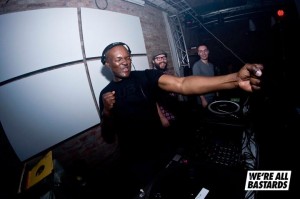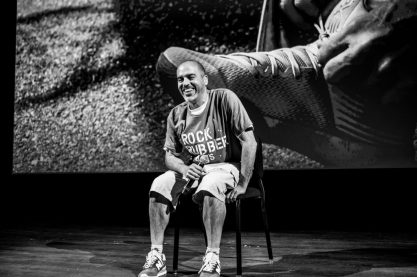Interviews
JOE NICE and the HISTORY OF DUBSTEP IN AMERICA, PART THREE

Joe Nice's rise from being an ex-Baltimore club DJ to being one of a chosen few at the forefront of the US dubstep movement spurred a relatively quick rise for stateside dub that quickly melded with an overseas "re-invasion." "It was in 2004 or 2005 when US promoters began to regularly book Kode9, Skream and Benga for gigs over here. I loved it! I would regularly spend $24 buying releases from these guys at record stores, and then they were here in the flesh. It was an awesome all-in moment for dubstep over here. They had a connection to us, and we had a connection to their music. It was a beautiful symbiotic relationship."
[youtube]http://www.youtube.com/watch?v=cwfWSX0FYlI[/youtube]
However, as dubstep's popularity rose, American pop concepts began to infiltrate the sound. UK dubstepper Rusko's "Cockney Thug" and remix to Kid Sister's "Pro Nails" bore little resemblance to what had come before, and for UK and US kids with little connection to underground idealism, they latched onto the bass-wobbling, catchy and derivative sound. "You had the wobbling basslines," Nice says. "They were cool, but you have to be responsible with the wobble. When it got into a game of who could switch levels, and play louder and became a massive wobble fest, it totally lost the power of the original effect."
[youtube]http://www.youtube.com/watch?v=WtMlB-BEMso[/youtube]
Nice is famously quoted as saying, "I don't want dubstep to become brostep. If it does, I'm selling my equipment, giving away my dubs, and I'm done." Upon being questioned about the nature of the American fascination with dubstep's movement into harsher and aggressive sounds, he answers thoughtfully. "There's very little nuanced about dubstep anymore. There's a generation of kids who were presented the wobbles and the harder-edged sound without knowledge or a desire to remember what came before, and were told 'this is dubstep, this is cool."
[youtube]http://www.youtube.com/watch?v=eOofWzI3flA[/youtube]
Preserving the OG roots is a hard directive, but one Nice meets head on with a frequent national and international touring schedule. However, playing a vastly different sound than the pop expectation leads to a very poignant statement. "I really wish what a lot of these guys are doing now wouldn't be called dubstep. I'm sure even if you asked them, they wouldn't call what they make dubstep. But they're gonna do what they're gonna do. I'll never knock anyone who has reached a certain level of success. It's all well and good, but it definitely gives a false impression of what the sound is all about."
Many would consider Nice's wish for two separate schools of thought on dubstep to be indicative of staid and non-progressive thought. Nice has an answer for those occupying that school of thought as well. "(Many) say dubstep is evolving. I'm a dubstep purist, a traditionalist, and this is something different. To me, evolution is man going from walking on all fours to walking upright, and evolving as man. Dubstep went from being all about people listening to sounds to see who can sound the loudest. It's gone from being an inventive and organic style to being about who's badder and angrier." Nice continues, "The sound's lost all of it's original intent. It's like hair metal bands in the 80s. It went from Motorhead and Iron Maiden looking tough and playing well to Motley Crue in makeup and Winger having teased hair. The image superseded the music."
In the past year, ex-UK now LA residing second-generation don Rusko, describing aggressive 'brostep' as "like a whole lot of people screaming in your face,"has eschewed the sound for live sets that fall more in line with classic expectations. This fits with Nice's ideals as well. "Dubstep was never meant to be that aggressive. It's root is dub, which is more peaceful, giving space to let songs breathe. Dubstep's meant to have bass, not all mid-range. It's too far gone in the other direction."
While a Skrillex Grammy victory may appear to be a victory for dubstep, those thinking that the directive for aggressive, ear-splitting symphonies may continue could have another thing coming. "Original dubstep is coming back," Joe Nice asserts. "This mid-range fad will die, and we'll get back to real bass. There's already parties like Reconstruct in New York that are succeeding at keeping the original sound alive. We have the proper sound systems now in America to create the vibe and present the music and its bass correctly. 2012? Less overly aggressive for sure.
Dubstep's American journey is clearly as hardscrabble as it is impressive. Though it's apparent finish line is a point of division, if the predicted expectations hold up to the weight of reality, it's only apropos that selectors worldwide will pull a "REWIND!" for the sound's sonorous and percussive future.
